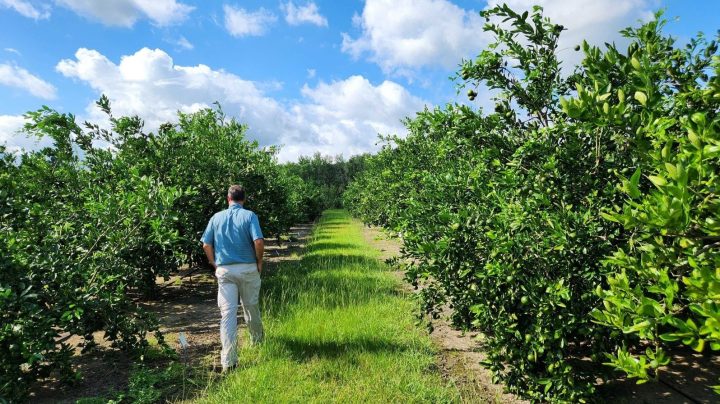
Citrus industry flowers in Georgia as winters get warmer
Citrus industry flowers in Georgia as winters get warmer

Georgia is well known for its peaches, blueberries, peanuts and pecans, but not its citrus. Neighboring Florida is a longtime citrus powerhouse, but Georgia’s always been too cold — until now. In the last decade, the number of citrus trees in Georgia has grown from just a few to more than 500,000. The combined forces of climate change, disease and science are helping a new citrus industry take root in the Peach State.
On a recent punishingly hot, sunny morning, Jake Price walked through his rows of citrus trees. This small plot is part of an experiment he’s leading as a scientist at the University of Georgia.
“Look how much fruit this tree has,” Price said, pointing to a tree straight out of a Tropicana commercial: lush, leafy and laden with plump, little tangos — one of the easy-to-peel varieties of citrus sold in stores as Cuties.
“There’s probably 25 pounds per tree on these,” he said.
But over the winter, this grove was put to its first big test. Around Christmas, these trees had to weather six days below freezing.
“You see the big gash on the bark?” Price asked, indicating a wound in a tree’s trunk. “They had a big freeze crack on this rootstock.”
It was the first bad freeze since small farms in Georgia began experimenting with citrus, starting with 10- or 15-acre plots. But those trees had yet to weather a bad winter. Farmers worried their brand-new crop was about to be destroyed.
But for Price, the cold snap became part of his experiment. He’s trying to identify which rootstock — the base of a citrus tree — can best stand the cold.
“It’s kind of a rare opportunity to get some data on which rootstocks give the best cold protection on these tangos, so I’m gonna get it while the getting’s good,” he said.
While there are still cold snaps like this, Price said they’re less common than they used to be.
Climate change is heating up winters especially fast. The average winter temperature in south Georgia has risen 6½ degrees since 1970, according to Climate Central. That means fewer sustained freezes, which makes Georgia an increasingly good place for citrus.

“We have a piece of fruit that looks like it’s grown in California but tastes like it’s grown in Florida, which is what everybody wants,” said Justin Jones, who grows Satsumas and navel oranges near Albany, Georgia.
Farmers said the humidity there, like in Florida, makes for sweeter, juicier fruit.
Jones also grows pecans and cotton and sees citrus as a chance to diversify his crops. Plus, he said, disease in Florida has created an opening in the citrus market.
“Unfortunately, in the farming community, in the farming world, somebody has to do bad for somebody to do good,” he said.
Florida citrus is doing very badly. A disease called citrus greening has devastated the industry there. The state has fewer than half the citrus acres it had in the ’90s as a result. The greening disease hasn’t gained a foothold in Georgia, and growers are trying to keep it that way.
And after Georgia’s small citrus farms survived last winter, Georgia Citrus Association President Lindy Savelle said bigger farms are getting interested.
“They realize, ‘Well, my gosh, if I can handle 17, 15 degrees for four days, that’s a 30-year weather event. I think I can do this,’” she said.
She added that even though the freeze may mean less fruit to harvest in a few months, it was a big test — and Georgia citrus passed.
The original reporting for this story was made possible through a partnership between WABE and Grist, a nonprofit, independent media organization dedicated to telling stories of climate solutions and a just future. A version of this story first appeared on WABE and Grist.
There’s a lot happening in the world. Through it all, Marketplace is here for you.
You rely on Marketplace to break down the world’s events and tell you how it affects you in a fact-based, approachable way. We rely on your financial support to keep making that possible.
Your donation today powers the independent journalism that you rely on. For just $5/month, you can help sustain Marketplace so we can keep reporting on the things that matter to you.












